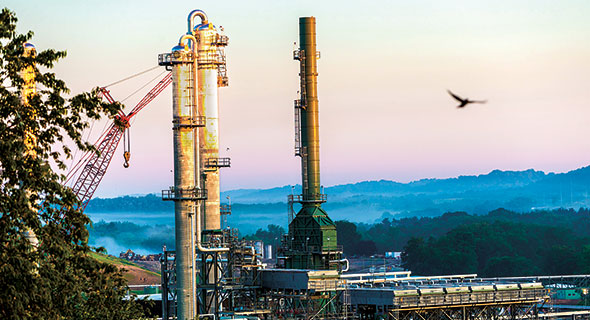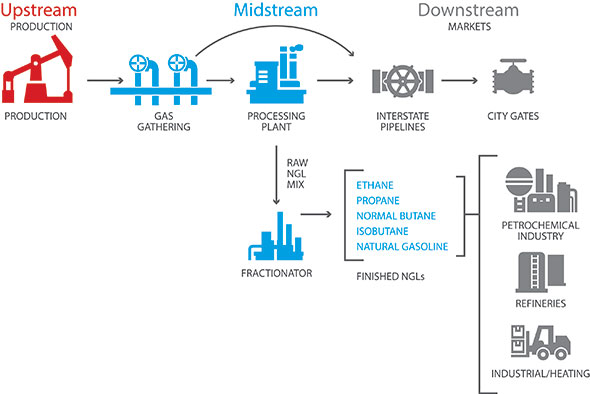Midstream association serves role in propane industry

After natural gas is processed, fractionators like this Ohio plant prepare finished NGLs. Photo courtesy of Williams Partners
Consisting of nearly 100 firms that gather and process natural gas and natural gas liquids (NGLs) such as propane, ethane, butane and natural gasoline, the GPA Midstream Association is making the grade by ensuring the flow of more than 90 percent of the nation’s propane supply.
In addition to removing impurities and other processing procedures, GPA Midstream’s roster companies and its companion 500-member Gas Processors Suppliers Association (GPSA) operate hundreds of thousands of miles of domestic gas-gathering pipelines along with a network of pipelines used for storing, transporting and marketing natural gas and related NGLs.
“They’re the trade organization that represents producers,” says Greg Kerr, director of research and development at the Propane Education & Research Council (PERC), “and they [undertake] some research projects that are helpful to the propane industry.”
PERC’s 2017 funding output includes $300,000 to supplement GPA Midstream’s overall annual budget of $660,000. An array of ongoing GPA Midstream research projects aims to analyze the complexities of water in propane and eventually create standards regarding the use of methanol to mitigate freezing problems.
GPA Midstream, PERC and the National Propane Gas Association (NPGA) are linked through an annual partnership agreement. PERC approved about $1.4 million for the 2017 agreement that it says helps fulfill a statutory obligation to coordinate its activities with industry organizations.
Propane industry involvement
GPA Midstream has close ties to propane industry companies. Over the course of his career, Mark Sutton, the association’s president and CEO, has seen many propane marketers, including those with a strong wholesale presence, involved in the association.
The organization also appoints 10 PERC members – nine producer representatives and one public member.
“What has proved valuable to us when we make producer appointments to the council is for the company to have a strong wholesale propane marketing operation,” he says. “As a general rule, it seems these types of council appointments are very engaged in the council’s mission.”
Throughout its history, GPA Midstream has had a significant impact on propane wholesalers and retailers by developing and maintaining the quality specifications for commercial propane and HD-5 propane, Sutton reports.
“GPA Midstream also developed and has maintained many of the early test methods that help determine propane quality, some of which are still used by the industry today,” he says.
The association also educates laboratory personnel who address LP gas quality-control procedures.
“For the past half-century, we have actively trained company and third-party commercial lab employees how to utilize GPA Midstream methods in analyzing natural gas and NGLs,” Sutton explains. “We also partner with our sister organization, GPSA, to publish the GPSA Engineering Data Book.”
A 14th edition of the book is in the process of being published.
Within the past couple of years, the association has developed two new courses. One trains new industry engineers how to better utilize the GPSA Engineering Data Book. The other provides an introduction to the midstream industry.
“The latter course could be one that retail propane companies might be interested in if they want their employees to better understand how propane and other NGLs are produced from natural gas,” Sutton says.

The GPA Midstream Association represents every aspect of the midstream industry. It also plays a part in propane industry issues. Image courtesy of GPA Midstream Association.
Name changes
Based in Tulsa, Oklahoma, the GPA Midstream Association dates back to 1921 when it was established as the Association of Natural Gasoline Manufacturers. Subsequent monikers included the Natural Gasoline Association of America, Natural Gas Processors Association and the Gas Processors Association (GPA). Its latest name change occurred last April.
“I don’t care if your business is 1 year old or nearly 100 years like ours, the name change process is neither easy nor fun, but it was necessary for us,” Sutton says. “Plain and simple, we’re no longer made up only of ‘gas processors’ and, in reality, that’s been the case for several years now. Our membership today represents every aspect of the midstream industry, and it’s time we make that claim.”
An important consideration in the name change was the fact that “GPA” has become much more visible in Washington, D.C., and in several key energy state capitals as a result of the association’s heightened advocacy efforts over the past few years, according to Sutton.
“Our association has made great strides in being a respected authority in legislative and regulatory arenas in dealing with everything midstream,” he says. “Government and environmental groups know us as GPA, and GPA Midstream keeps that identity plus bolsters our position as the experts on midstream issues even more.”
Partnering up
Although its advocacy efforts don’t generally reach as far downstream as typical retail propane issues, GPA Midstream has aligned with NPGA on certain issues over the years, Sutton says. For example, GPA Midstream has worked with NPGA and the American Petroleum Institute (API) to continue publication of NGL and liquefied refinery gases sales data.
“Several years ago, when the Energy Information Administration (EIA) elected to discontinue publication of its Sales of Natural Gas Liquids and Liquefied Refinery Gases, GPA Midstream, NPGA and API stepped in and co-funded the publication of this report, believing the information was too valuable to discontinue publication,” Sutton says. “After PERC was established and assumed funding of the report, GPA Midstream representatives now peruse the draft data to ensure its integrity. GPA Midstream representatives also work very closely with EIA on defining products and providing a practical reality check on what data EIA requests from the industry on natural gas and NGLs.”
GPA Midstream is holding its yearly convention April 9-12 in San Antonio. It will cover a variety of topics, including international affairs, legislative and regulatory issues, safety, market information, operations and maintenance, technical sessions and research. All of the organization’s respective committees will gather during the exposition.
















